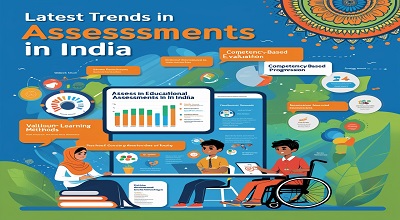Trends in Educational Assessments
Trends in Educational Assessments: Educational assessments in India have undergone significant transformations over the years. From traditional rote-learning exams to competency-based evaluations, the shift reflects global trends and India’s own educational policy reforms. The National Education Policy (NEP) 2020 has further accelerated changes in assessment methodologies, emphasizing holistic development, critical thinking, and digital integration.
Evolution of Educational Assessments in India
India’s assessment system has evolved from:
- Traditional Examinations (Pre-Independence): Focused on memorization and rigid testing.
- Board Exams (Post-Independence): Standardized tests like CBSE, ICSE, and state boards.
- Continuous and Comprehensive Evaluation (CCE): Introduced in 2009 to reduce exam stress.
- NEP 2020 Reforms: Shift towards competency-based, formative, and adaptive assessments.
Current Trends in Educational Assessments
1. Competency-Based Assessments
- Focus on application-based learning rather than memorization.
- Example: PARAKH (Performance Assessment, Review, and Analysis of Knowledge for Holistic Development) under NEP 2020.
2. Digital and Online Assessments
- Computer-Based Testing (CBT) for competitive exams (JEE, NEET).
- Online school exams due to COVID-19 (CBSE, state boards).
- Example: DIKSHA Platform for teacher and student assessments.
3. Formative and Continuous Assessments
- Reduced emphasis on year-end exams.
- Regular quizzes, projects, and class participation.
- Example: CBSE’s new exam pattern (2024-25) with more internal assessments.
4. Adaptive Testing
- AI-driven exams adjusting difficulty based on student performance.
- Example: Aptitude tests in IITs and EdTech platforms.
5. Multidisciplinary and Holistic Evaluations
- Assessing creativity, problem-solving, and life skills.
- Example: NIPUN Bharat Initiative for foundational literacy and numeracy.
6. AI and Data-Driven Assessments
- Automated grading systems.
- Predictive analytics for learning gaps.
- Example: Byju’s AI-powered personalized assessments.
Examples of Latest Assessment Trends in India
1. National Achievement Survey (NAS) 2023
- Conducted for Grades 3, 5, 8, and 10.
- Assesses learning outcomes in Math, Language, and EVS.
2. CBSE Reforms (2024 Onwards)
- Two board exams per year (Best score considered).
- More MCQs and competency-based questions.
3. State-Level Initiatives
- Kerala: “Samagra Shiksha” for holistic assessments.
- Tamil Nadu: “Ennum Ezhuthum” for foundational skills.
4. Private EdTech Innovations
- Byju’s: AI-based adaptive tests.
- Vedantu: Real-time doubt-solving assessments.
Challenges in Implementing Modern Assessment Systems
- Digital Divide: Rural vs. urban access to online assessments.
- Teacher Training: Educators need upskilling for new methods.
- Exam Stress: Despite reforms, pressure remains high.
Future of Educational Assessments in India
- Greater AI integration.
- More focus on skill-based evaluations.
- Global benchmarking (PISA participation).
Conclusion
India’s assessment landscape is shifting towards student-centric, digital, and competency-based models. While challenges persist, reforms like NEP 2020 are paving the way for a more inclusive and progressive evaluation system.
FAQs
1. What is the biggest change in India’s assessment system after NEP 2020?
- Shift from rote learning to competency-based, formative, and multidisciplinary assessments.
2. How are digital assessments being implemented in rural India?
- Through DIKSHA, SWAYAM, and state-led digital education initiatives, though challenges like internet access remain.
3. What is PARAKH in NEP 2020?
- A national assessment body to standardize student evaluations and reduce disparities across boards.
4. Are board exams being abolished in India?
- No, but CBSE and state boards are reforming exams to include more internal assessments and flexibility.
5. How do AI-driven assessments help students?
They provide personalized feedback, adaptive learning paths, and reduce grading bias.
New Here: Download CarX Highway Racing MOD APK
